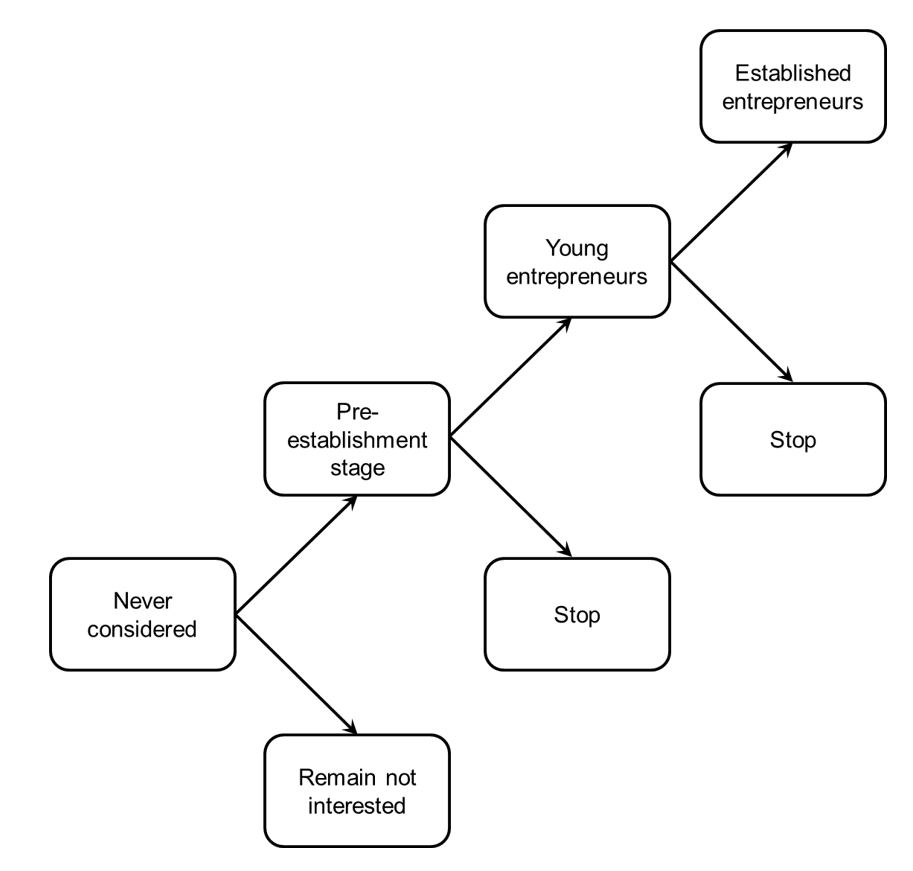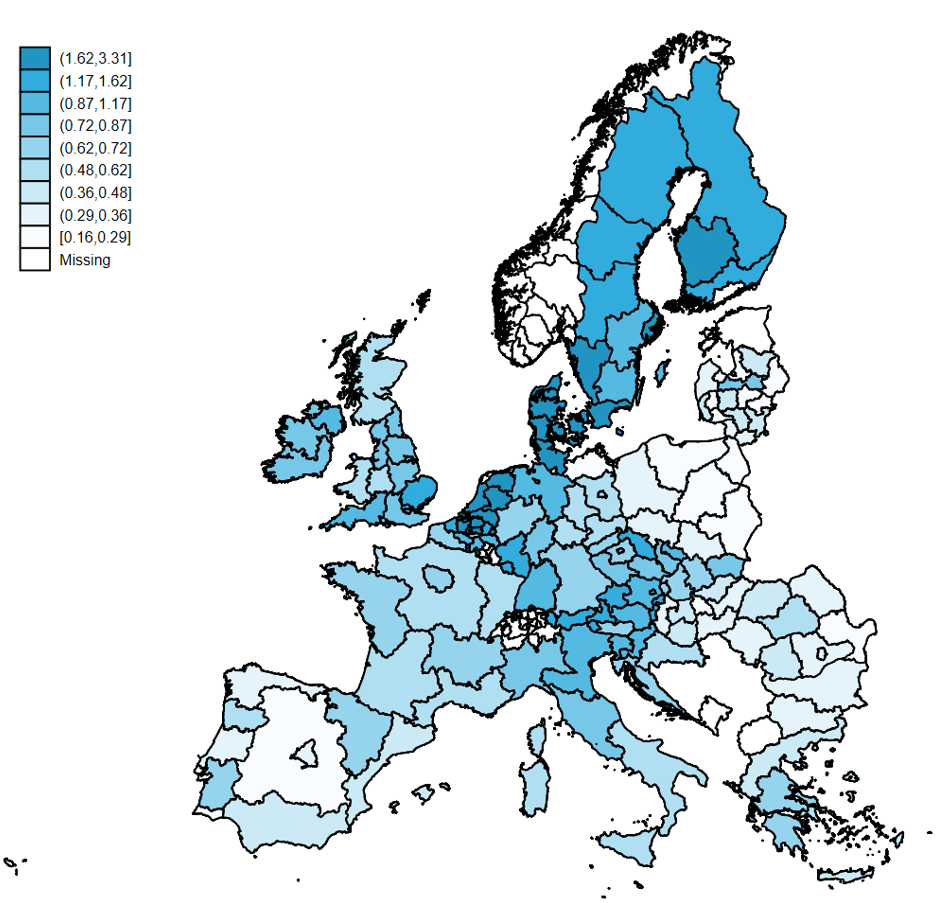
0 comments | 5 shares
Estimated reading time: 3 minutes
0 comments | 5 shares
Estimated reading time: 3 minutes
The entrepreneurial process does not take place in a vacuum but is deeply embedded in its context, such as where a would-be entrepreneur lives. Johannes Kleinhempel, Sjoerd Beugelsdijk, and Mariko J. Klasing analyse how socio-cultural conditions shape entrepreneurship, emphasising the critical importance of regional social capital and the changing role of contextual conditions over the course of the entrepreneurial process.
Many people would like to become entrepreneurs, yet few try, and even fewer manage to start a business or become self-employed. For example, while as many as half of Londoners would rather be self-employed than employees, only one in six actually achieve their goal.
Given that entrepreneurship is an important driver of innovation, job creation, wellbeing, and growth, these differences may have far-reaching consequences for individuals and economies alike. Therefore, understanding the drivers of the pronounced and persistent differences in entrepreneurship is of critical importance not just from an academic point of view, but also in terms of policymaking and entrepreneurship programmes.
In a recent paper, we looked at entrepreneurship as a dynamic multi-staged process. These stages of the entrepreneurial process — never-considered entrepreneurship, pre-establishment stage, recently started young entrepreneur, and established entrepreneur — capture different underlying ‘situational’ characteristics –e.g., goals, milestones, needs, constraints– faced by entrepreneurs. Treating entrepreneurship as a multi-staged process matters because it may expose when bottlenecks arise in the venture creation process.
Figure 1. The multi-staged venture creation process
The entrepreneurial process does not take place in a vacuum but is deeply embedded in its context, such as where a would-be entrepreneur lives. We argue that one particularly important contextual driver of entrepreneurship is regional social capital (see also Putnam’s seminal work here and here). Regional social capital arises from repeated interactions within voluntary associations (e.g., sports, environment, and animal rights groups and professional associations).
Regional social capital helps would-be entrepreneurs gain access to information and resources. Recognising that goals, needs, and constraints change throughout the entrepreneurial process, we argue that the positive effect of regional social capital should be largest when individuals who want to become entrepreneurs attempt to mobilise the resources required to launch a venture formally.
Figure 2. Regional social capital across the European regions
To test the hypothesis, we analysed information on levels of entrepreneurial engagement and regional social capital for more than 22,000 individuals who live in 110 regions across Europe. Regional social capital is measured as average membership in voluntary associations. We find that regional social capital influences the entrepreneurial process positively, but at different stages to different degrees. Regional social capital is most relevant for the odds that individuals who want to start a business manage to do so, but regional social capital does not affect the likelihood that individuals become interested in entrepreneurship or that young ventures, once started, survive.
The study advances our understanding of entrepreneurship as a dynamic process in which the social context exerts a profound and changing influence. This calls into question an implicit assumption in comparative entrepreneurship research, namely that of a uniform impact of contextual factors on the different stages of the venture creation process. Instead, we need to be looking at the variability of contextual effects.
Why entrepreneurial activity is more common in some contexts than in others is a pressing question for policymakers around the globe who seek to encourage entrepreneurship, for managers wishing to promote intrapreneurship and corporate entrepreneurship, as well as for individuals who aspire to set up a business who are assessing potential markets and locations.
Many governments and international organisations have developed entrepreneurship promotion programmes that try to facilitate entrepreneurship by making structural adjustments. For instance, they do this by improving the institutional conditions or by equipping individuals with the skills, networks, and self-efficacy to launch ventures. However, these programmes pay typically little attention to the socio-cultural conditions.
Our findings, therefore, offer potentially important implications for practitioners and policymakers by highlighting that entrepreneurship is embedded in its socio-cultural context. Regional social capital originating from voluntary associations generates positive spillover effects that facilitate entrepreneurship and innovation. Regional social capital may be strengthened by enhancing the conditions for membership and participation in voluntary associations. For example, the provision of physical meeting spaces, shared by multiple associations, could enhance membership in voluntary associations, foster the creation of cross-cutting ties, and facilitate the emergence of regional social capital. Vice versa, policy changes that influence membership in voluntary associations negatively either directly or indirectly –such as reducing financial support for associations– may be associated with unintendedly large negative externalities. Short-term public savings could be more than offset by the loss of positive spillovers generated from membership in voluntary associations.
Our research provides fresh insights into how socio-cultural conditions shape entrepreneurship and adds a fresh perspective to comparative international entrepreneurship research that underlines (1) the critical importance of regional social capital in entrepreneurship and (2) the changing role of contextual conditions over the course of the entrepreneurial process.
♣♣♣
Notes:
Johannes Kleinhempel is a Presidential Academic Fellow of Comparative and International Business at Alliance Manchester Business School.
Sjoerd Beugelsdijk is Professor of International Business at the University of Groningen.
Mariko J. Klasing is an Associate Professor in the Department of Global Economics and Management at the University of Groningen.
Your email address will not be published. Required fields are marked *
This site uses Akismet to reduce spam. Learn how your comment data is processed.
© LSE 2022










